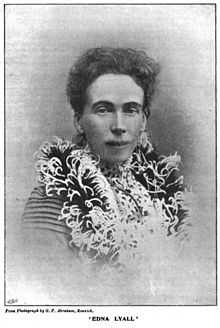Ada Ellen Bayly
| Ada Ellen Bayly | |
|---|---|
 | |
| Born |
25 March 1857 Brighton, Sussex |
| Died | 8 February 1903 (aged 45) |
| Nationality | English |
| Other names | Edna Lyall |
| Occupation | novelist |
| Signature |
 |
Ada Ellen Bayly (March 25, 1857 – February 8, 1903), a.k.a. Edna Lyall, was an English novelist, and an early feminist.[1]
Biography
Bayly was born in Brighton, the youngest of four children of a barrister. At an early age, she lost both her parents and she spent her youth with an uncle in Surrey and in a Brighton private school. Bayly never married and she seems to have spent her adult life living with her two married sisters and her brother, a clergyman in Bosbury in Herefordshire.
In 1879, she published her first novel, Won by Waiting, under the pen name of "Edna Lyall" (apparently derived from transposing letters from Ada Ellen Bayly). The book was not a success. Success came with We Two, based on the life of Charles Bradlaugh, a social reformer and advocate of free thought. Her historical novel In the Golden Days was the last book read to John Ruskin on his deathbed;[2] while Hope the Hermit was a best-seller set in the Lake District which was later an inspiration for Hugh Walpole's Rogue Herries.[3]
Bayly wrote in all eighteen novels, many of them offering interesting explorations of the writer's creative process.[4] Part of her success was due to her practice of using characters from one novel in a different capacity in her next.[5]
Select list of works
- Won by Waiting, 1879.
- Donovan, 1882.
- We Two, sequel of the former, 1884.
- In the Golden Days, 1885.
- Autobiography of a Slander, 1887.
- To Right the Wrong, 3 vols., 1894.
- The Autobiography of a Truth, 1896.
- Hope the Hermit, 1898.
- The Burgess Letters, 1902.
See also
- Algernon Sydney
- Charles Bradlaugh
- Elizabeth Gaskell
Citations
- ↑ G. Lindop, A Literary Guide to the Lake District (1993) p. 311
- ↑ Drabble, Margaret (ed.) (1995), The Oxford Companion to English Literature (5th revised edition), Oxford, England: Oxford University Press.
- ↑ G. Lindop, A Literary Guide to the Lake District (1993) p. 311
- ↑ Darby Lewes, Auto-poetica (2006) p. 67
- ↑ S. Mitchell, Victorian Britain (2012) p. 468
References
 This article incorporates text from a publication now in the public domain: Cousin, John William (1910). A Short Biographical Dictionary of English Literature. London: J. M. Dent & Sons. Wikisource
This article incorporates text from a publication now in the public domain: Cousin, John William (1910). A Short Biographical Dictionary of English Literature. London: J. M. Dent & Sons. Wikisource
Further Reading
- G. A. Payne, Edna Lyell: An Appreciation (1903)
External links
- Works by Ada Ellen Bayly at Project Gutenberg
- Works by or about Edna Lyall at Internet Archive
- Works by or about Ada Ellen Bayly at Internet Archive
- Works by Ada Ellen Bayly at LibriVox (public domain audiobooks)

- Won by Waiting (1892) Appleton, New York (Google ebook)
- Jesse Maria Escreet (1904) The life of Edna Lyall (Ada Ellen Bayly), Longmans, Green, and Co., London (Google ebook)
| Library resources about Ada Ellen Bayly |
| By Ada Ellen Bayly |
|---|
|